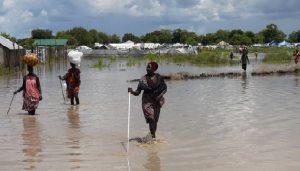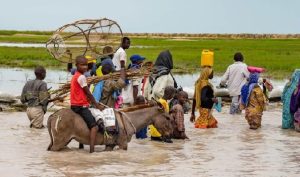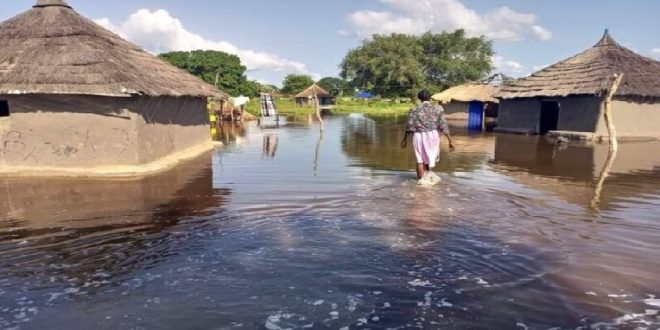22-10-2024
KHARTUM: Millions of people in South Sudan have been affected by floods across much of the country, the UN’s humanitarian organization, Ocha, has said.
More than a quarter of those many in the north have been forced from their homes by rising waters.
 Ocha said the displaced were seeking refuge on higher ground, but the rains have also meant that getting aid to those who need it had become increasingly difficult.
Ocha said the displaced were seeking refuge on higher ground, but the rains have also meant that getting aid to those who need it had become increasingly difficult.
This is one of the worst flood seasons that South Sudan, a country with a population of more than 11 million people has experienced in recent decades.
In Pibor, in the east, 112,000 people have lost their homes, according to a government relief agency there.
Those who have fled to higher ground “don’t even have food, they left everything in that previous location”, Joseph Nyao, director of Relief and Rehabilitation told media from Pibor.
He added that the government was urging people in areas threatened by floods to “immediately move to higher grounds that have been identified by local authorities for their safety”.
“The level of water is still increasing and the displacement is continuing.”
In May, the government alerted the international community to the risk of exceptional floods that were expected to hit the country in the subsequent months.
Ocha said that since the rains began 15 major supply routes have been rendered impassable, affecting the delivery of essential humanitarian aid to some 500,000 people in different parts of the country.
This all comes as South Sudan continues to deal with the impact of the 18-month civil war in neighboring Sudan.
More than half a million Sudanese refugees and returnees from South Sudan have been registered in South Sudan since April last year.
South Sudan, already in the throes of a worsening humanitarian situation, is seeing its ability to respond become further overstretched, Ocha warned.
 South Sudan gained independence from Sudan on 9 July 2011 as the outcome of a 2005 agreement that ended Africa’s longest-running civil war.
South Sudan gained independence from Sudan on 9 July 2011 as the outcome of a 2005 agreement that ended Africa’s longest-running civil war.
Made up of the 10 southern-most states of Sudan, South Sudan is one of the most diverse countries in Africa. It is home to over 60 different major ethnic groups.
Independence did not bring conflict in South Sudan to an end. Civil war broke out in 2013 when the president fell out with his then vice president, leading to a conflict that has displaced some four million people.
A power-sharing agreement was signed between the warring parties in August 2018 in a bid to bring the five-year civil war to an end. Salva Kiir Mayardit became president of South Sudan then still part of Sudan – and head of the Sudan People’s Liberation Movement (SPLM) in 2005, succeeding long-time rebel leader John Garang, who died in a helicopter crash.
Kiir was re-elected as president in multiparty polls in the south in April 2010. In July 2011, when South Sudan became independent, he became president of the new state. Just two years later, however, the country was engulfed by civil war when Kiir sacked his entire cabinet and accused Vice-President Riek Machar of instigating a failed coup. In August 2018, after five years of civil war, Kiir signed a power-sharing agreement with rebel leader Machar and other opposition groups in a bid to end the brutal conflict.
Constitutional guarantees of media freedom are not respected in practice, and journalists risk harassment and detention over reports deemed unfavorable by the authorities. (Int’l News Desk)
 Pressmediaofindia
Pressmediaofindia




